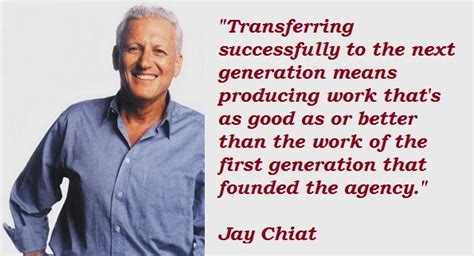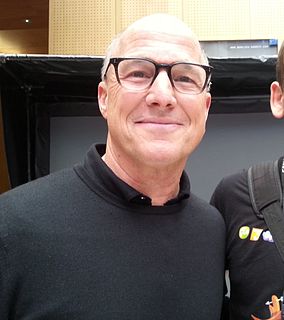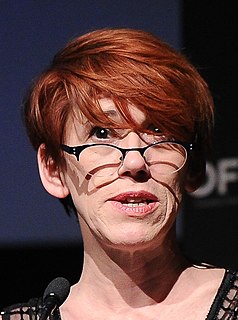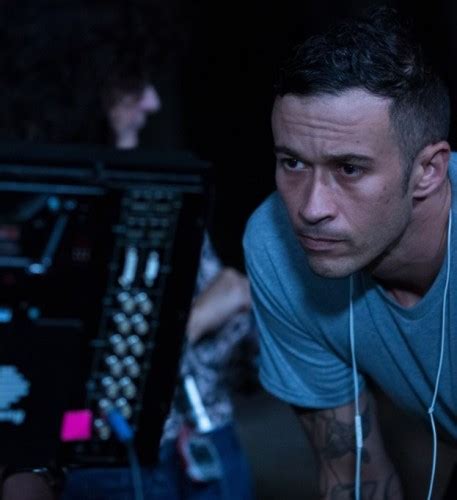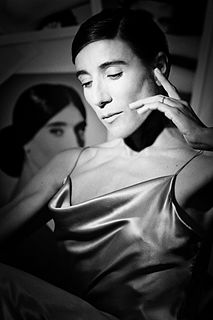A Quote by Bruce Cohen
It is true that ADs do not get a chance to get a chance to create or produce, almost never, because it's whole separate thing. Most creative producers you have to come up on the development side, you work with agents, you work with writers, you're in the office and then the AD's are on the set. But it's a real shame because part of - no decision in producing can be made correctly unless you have all the creative information you need but you also have all the budget and scheduling information you need.
Related Quotes
I think that I would really like at first for the art to speak for itself. I don't see the need for a lot of personal information about my past or who I am. I would rather the personal side of it just be in the concepts and the genuine feelings that I filter through my work. I know that it's inevitable that people can find whatever they want about me. Once I've had a chance to create a language and a world with my art, then I'm more comfortable sharing that information.
My teachers believe that the creative producer's job is to service the vision of the director, to stay within schedule and budget, and to get the studio what they need, but you work for the director to get their vision on the screen. That's not how everyone approaches producing, but it is certainly how directors like you to approach producing. How I was brought up is that my job is to help you make the movie you want to make.
Creative non-fiction is such a liberating genre because it allows the non-fiction writer, whether he or she be journalist or essayist, to use all of the techniques of the fiction writer and all of the ideas, creative approaches, that fiction writers get a chance to use, but they have to use it in a true story.
Separate out the creative act from the act of editing and execution. Make it a two-step process. First, let ideas flow and encourage EVERY idea to make it to the whiteboard. Don't criticize, judge, edit, budget, or worry. An idea on the wall can't hurt anyone, so let them rip without restriction. After any and all ideas have the opportunity to "come out to play", only then should you apply your analytical and logical side to the effort. Don't mix the creative process with the editing process or you'll kill your ideas before they even get a fighting chance.
I feel like the personal me and the artistic me are separate, but connected. It's almost like a Jekyll and Hyde thing. As much as you try to keep them apart, they end up together. I'm very much aware that when I'm miserable on the creative side - if I can't make things work a certain way - it really detracts from being the father I want to be. So in order to ultimately be a good father and the man I want to be I know I need to keep my creative side in check, or at least a little bit happy. It's weird how it's intertwined that way.
When you have creative people, you have to let them do their thing. You have to resist the urge to be too efficient, you have to resist the urge to work to a certain budget and schedule - other than the fact that things have to end. It's harder work to produce this way but my philosophy is that you have to let it be creatively chaotic and let it find its place. When creative people are on to something, you know it and you have to allow it to happen. You can't set a schedule for that.
Making a show is also economics. Because the irony is, or the shame of it is, you cannot create a show instantaneously. It needs to be massaged. You need to see who is relating to who. How is it working with the audience? You need to give it a chance for the audience to find it, because there are so many outlets. And the audience doesn't know where to go.
The most important feature of an information economy, in which information is defined as surprise, is the overthrow, not the attainment, of equilibrium. The science that we have come to know as information theory establishes the supremacy of the entrepreneur because it appreciates the powerful connection between destruction and what Schumpeter described as "creative destruction," between chaos and creativity.
Filmmaking and television series are team sports. Look for the best team for you. Plan, budget your time, money and spirit. You need all three to get serious work done. Never say no because something scares you. Never say yes because you're flattered. Stay open, but stay proud. It never gets easy. Get over that part. Get on with it.
I never consciously place symbolism in my writing. That would be a self-conscious exercise and self-consciousness is defeating to any creative act. Better to get the subconscious to do the work for you, and get out of the way. The best symbolism is always unsuspected and natural. During a lifetime, one saves up information which collects itself around centers in the mind; these automatically become symbols on a subliminal level and need only be summoned in the heat of writing.
People don't want to pay for pitches. They want to see it. If you hear one more time, "Well, that's execution-dependent." Everything's execution-dependent! If there's something that's going to be a little bit more interesting than The Untitled Slinky Movie, then I think that writers that want to do interesting work and at the same time commercial work need to put it down on paper. So agents and producers that writers are working with are encouraging them to get it on paper because the studios like to see what they're buying rather than just imagine what it could be.
Part of why I wanted to produce was because I wanted the opportunity to work on projects I want to see. As a writer and as a director, I'm very specific about the kinds of things that I want to do. The opportunity that producing has given me is that by working with different writers and trying to get their movies made, or developing their script, or making their movies, every time I'm doing it, I'm learning and then bringing something to my own work. I like to think that there's a little bit of back and forth that goes on.
If you're a night person you can barely get out of bed in time to get to work or get your kids off to school. You're at your most productive and creative much later in the day, and for you, something like getting up early to go for a run is not going to set you up for success because you're not a morning person.
My ideas come, and there is a deep desire to create. Sometimes it's stronger than me. Sometimes I have to do projects that I know are almost impossible but I still have to do them. It's like a muscle - if you are a dancer, you need to dance, if you are a creative person, you need to create. It's part of your life.





